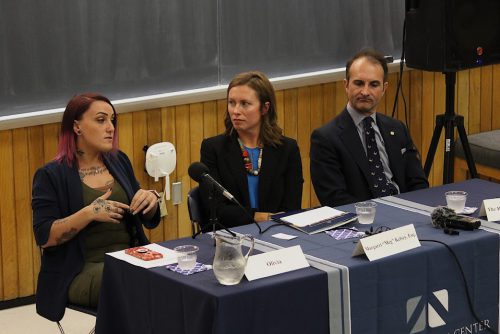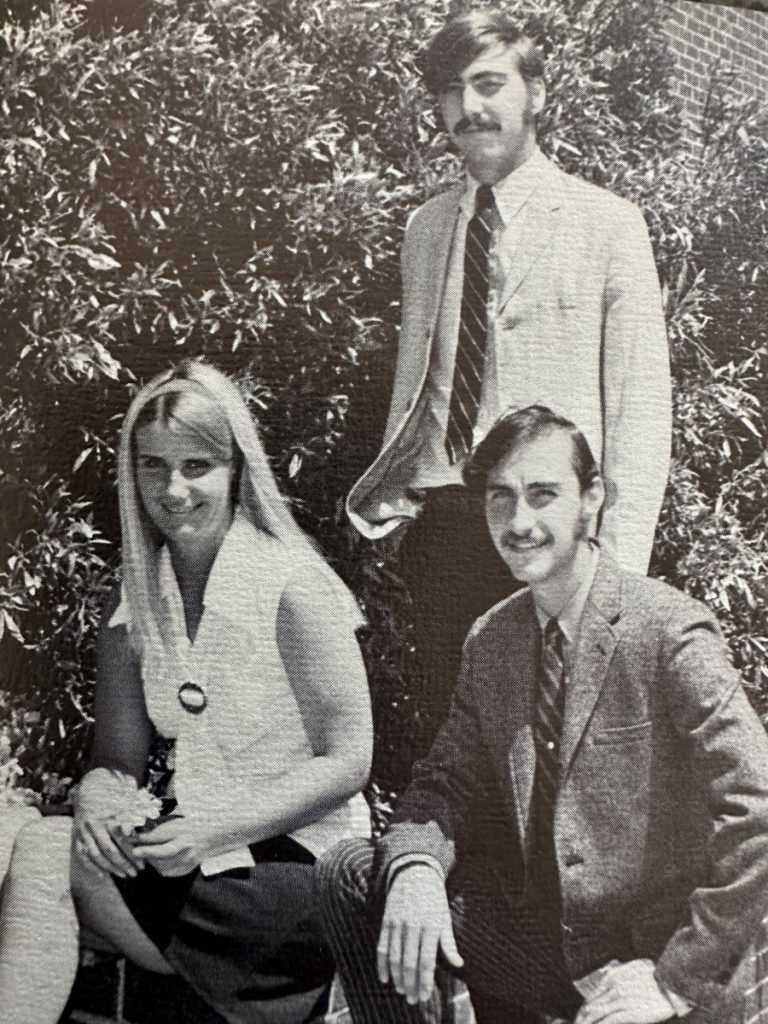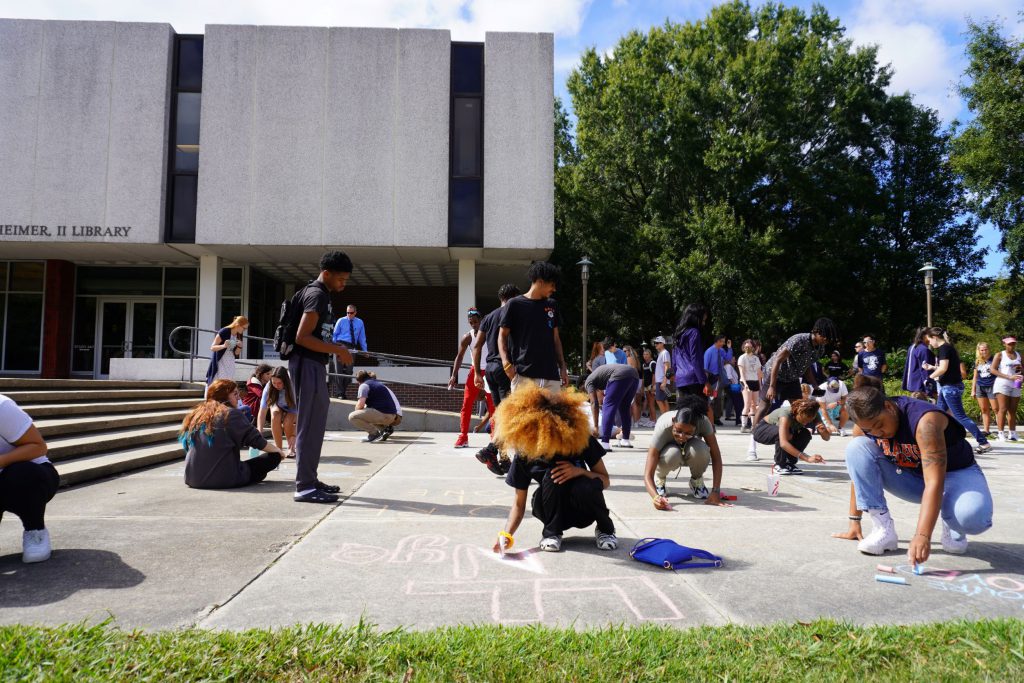Featured Image: Nusbaum event panelist Olivia Reposa shares her story with the support of legal professionals, Meg Kelsey and Ramin Fatehi. McKenna Howenstine | Marlin Chronicle
Campus speakers unveil the complexities of human trafficking and the challenges that survivors must face after freedom.
Individuals subjected to human trafficking lose their freedom. The story of Olivia Reposa, a human trafficking survivor, shines a light on the experiences of victims. Panelists Reposa, the first person in Virginia to have her convictions expunged, Meg Kelsey, the attorney who filed the petition on her behalf and Ramin Fatehi, Norfolk Commonwealth’s Attorney, convened on the topic of human trafficking and its legal ramifications during a Robert Nusbaum Center event on Sept. 20.
When someone is swept into human trafficking, it is difficult to break free. It is even harder for someone who is brought into the life at a young age.
Reposa’s story as a trafficking victim began at age 18 in Boston, Massachusetts. Through several changes in her location and trafficker, she was not fully free until 15 years later.
Trafficked people are coerced into crime, blurring the line between victim and criminal in the eyes of law enforcement.
Reposa detailed her experience of being coerced into stealing from a retail store as a means to reduce the number of days she would have to subject herself to prostitution.
“It’s a lot of manipulation,” Reposa said. She explained how rather than brute force, the consequences that traffickers dangled over her head become their own tool for persuasion. It was more so, “If you don’t do this, you know what the consequences are,” Reposa said.
Reposa was forced to shut out her sense of right and wrong in order to survive, and then she was then punished for it all over again when she escaped.
“I was convicted of these crimes solely because I was being trafficked,” Reposa said.
“No one ever thought to say, ‘Do you need help?’ It was always just, ‘Put your hands behind your back. You’ve now solicited an undercover officer,’” Reposa said.
This has placed an incredible burden onto Reposa. “Criminalizing someone who’s not a criminal is very traumatic. And it carries a huge weight on me and my life,” Reposa said.
“No one ever thought to say, ‘Do you need help?’ It was always just ‘Put your hands behind your back.'” – Olivia Reposa
Despite her desire to break free from the past, Reposa’s record depicted her as a drug-addicted prostitute. “That’s not really who I am and that’s not who I wanted to be,” Reposa said.
Reposa pointed out how these circumstances apply to so many more who need help. “Nobody’s on drugs because they want to be. Nobody’s selling themselves because they want to be,” Reposa said.
Accompanied by two legal professional panelists, Reposa substantiated her story through the expertise of Attorney Meg Kelsey and The Honorable Ramin Fatehi, who brought further understanding to how misconceptions of human trafficking survivors within the legal system are causing harm on a broader scale.
Kelsey shed light on the shift in mentality about who is the criminal in cases of prostitution, and the progress that is still left to make.
Kelsey said that it took time for authorities to realize that they were arresting the wrong people. “It is so clear the person in that hotel room did not have the will to commit this crime, and they were not in control,” she said.
The operation once simply consisted of an undercover officer responding to an ad for someone selling sex, and then arresting whoever was there. Despite the evolution of different approaches since then, Kelsey said the progress is not enough.
Kelsey said the legislation that advocates are looking to pass now is centered around the question of “How do we get to the root of this problem?” and shifting the blame away from the victims.
The panel emphasized how the problem must be attributed to both the buyers and the traffickers themselves, as they are the ones who possess the power in these situations. Their message was unanimous: Trafficked individuals are not at fault for what they have been coerced into.
Fatehi offered specifics into the legalities. “Virginia, historically, has been one of the most difficult places to get a second chance when it comes to criminal records,” Fatehi said.
This means that the expungement process has painstaking requirements, making it nearly impossible for trafficking survivors who want to get their life on track.
Fatehi said the current systems in place are impeding survivors’ abilities to move forward with their lives. “People are holding against you something they have no context for, no appreciation of and no interest in learning,” Fatehi said.
This lack of understanding from the legal system acts as a roadblock to all that Reposa planned to achieve. She could no longer be a nurse like she hoped. She is obstructed in the custody battle for her daughter.
The students in the audience at the talk responded. Sophomore Brynn Dajc learned a lot about the situation that victims are left in. “Even as a Criminal Justice student, I had no idea that human trafficking victims, once they got out, lived with the criminal record as a result of their abuse,” Dajc said.
To describe their reaction, Dajc said, “Frustrating doesn’t even really begin to describe it.” Dajc said it’s “enraging” that this criminal record follows survivors as they try to get jobs, apartments and rebuild their lives.
Fatehi said citizens who feel compelled to help can vote for candidates whose values align with theirs and the rights of human trafficking survivors.
By Lily Reslink



